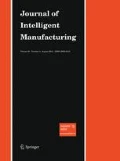Abstract
This manuscript surveys the changes that affected the automotive industry in recent years with the evolution of industrial focus on globalization forces. Further, it proposes organizational learning as a viable strategy for the automotive industry, to effectively embrace and be agile to the continually changing environment. First, the manuscript characterizes and surveys the impact of globalization (global markets and competitors) on the current automotive industry in three categories: challenges in new markets, challenges in mature markets, and challenges in customer demands and hence sales trends. Second, the traditional strategies implemented in the automobile industry such as the “Company” and “Plant” specific production systems are presented. Lastly, the manuscript supports its proposal through case examples from Original Equipment Manufacturers the Rover group and Volvo AB.
Similar content being viewed by others
References
American National Standards Institute, ANSI. (2002). National standards strategy for the United States. Washington, DC: ASNI.
Argyris C., Schoen D. (1978) Organizational learning: A theory of action perspective. Addison-Wesley, Reading, MA
Atkinson J. (1984) Manpower strategies for flexible organizations. Personnel Management 16(8): 28–31
Berggren C. (1997) Advanced automation or alternative production design? A reflection on the new Japanese assembly plants and the alternative approach of Volvo Uddevalla. In: Shimokawa K., Juergen U., Fujimoto T. (eds) Transforming automotive assembly, experience in automation and work organization. Springer, New York
Bratton J. (1992) Japanization at work. Macmillan Press, Basingstoke
Constanze C. (2005) Automotive production systems and standardization. Springer, Heidelberg
Dahmus J., Gonzalez-Zugasti J., Otto K. (2001) Modular product architecture. Design Studies 22(5): 409–424
Fung R., Chong P. (2007) An active styling platform for designing and developing product families. Journal of Intelligent Manufacturing 18(1): 47–58
Hahn R. W. (1995) An economic analysis of scrappage. The RAND Journal of Economics 26(2): 222–242
Hawkins P. (1994) Organizational learning. Management Learning 25(1): 71–82
Hitomi K. (1996) Manufacturing systems engineering. Taylor & Francis, London
Jiao, J., Simpson, T. W., & Siddique, Z. (2007). Product family design and platform-based product development: A state-of-the-art review. Journal of Intelligent Manufacturing, 18(1), 5–29.
Juergen U. (1995) Lean production and Co-determination; the German experience. In: Babson S. (eds) Lean work: Empowerment and exploitation in the global auto industry. Wayne State University Press, Detroit
Kenney M., Florida R. (1993) Beyond mass production. Oxford University Press, Oxford
Legge K. (1995) Human resource management: Rhetorics and realities. Macmillan Business, London
Lueth, T. C., Laengle, T., Herzog, G., Stopp, E., & Rembold, U. (1994). KANTRA-human-machine interaction for intelligent robots using natural language. Robot and Human Communication, RO-MAN apos; 94 Nagoya, In: Proceedings of the 3rd IEEE international workshop.
Morgan G. (1997) Images of organization. Sage Press, London
Nonaka I. (1988). Towardmiddle-up-down management: Accelerating information creation. Sloan Management Review 29(3): 9–18.
Ray S. (2006). Manufacturing interoperability. Journal of Intelligent Manufacturing, Special issue on E-manufacturing and web-based technology for intelligent manufacturing and networked enterprise interoperability 17(6): 681–688
Restructuring Engineering Education. (1995). A focus on change, The national science foundation, http://www.nsf.gov/pubs/stis1995/nsi9565/nsf9565.txt.
Senge P. (1990) The fifth discipline: The art and practice of the learning organization. Doubleday Business Press, New York
Storey J. (1994) New wave manufacturing strategies. Paul Chapman, London
Storey J. (1995) Human resource management: A critical text. Routledge, London
Taylor A. (1992a) It is slow lane for automakers. Fortune 133(6): 59–61
Taylor A. (1992b) The new golden age of autos. Fortune 129(7): 50–61
The Economist. (1997). Issue: May.
Todd, R. H. (2001). Manufacturing: A strategic opportunity for engineering education. Journal of Engineering Education.
West P. (2000) Organizational learning in the automotive sector. Routledge Advances in Management and Business Studies, London
Winnes, R., Die Einfuehrung Industrieller (2002). Produktionssysteme als Herausforderung fuer Organisation und Fuehrung, Karlsruhe: Universitaet Karlsruhe TH.
Zuboff S. (1988) In the age of the smart machine. Basic Books, New York
Author information
Authors and Affiliations
Corresponding author
Rights and permissions
About this article
Cite this article
Omar, M., Mears, L., Kurfess, T. et al. Organizational learning in automotive manufacturing: a strategic choice. J Intell Manuf 22, 709–715 (2011). https://doi.org/10.1007/s10845-009-0330-6
Received:
Accepted:
Published:
Issue Date:
DOI: https://doi.org/10.1007/s10845-009-0330-6




